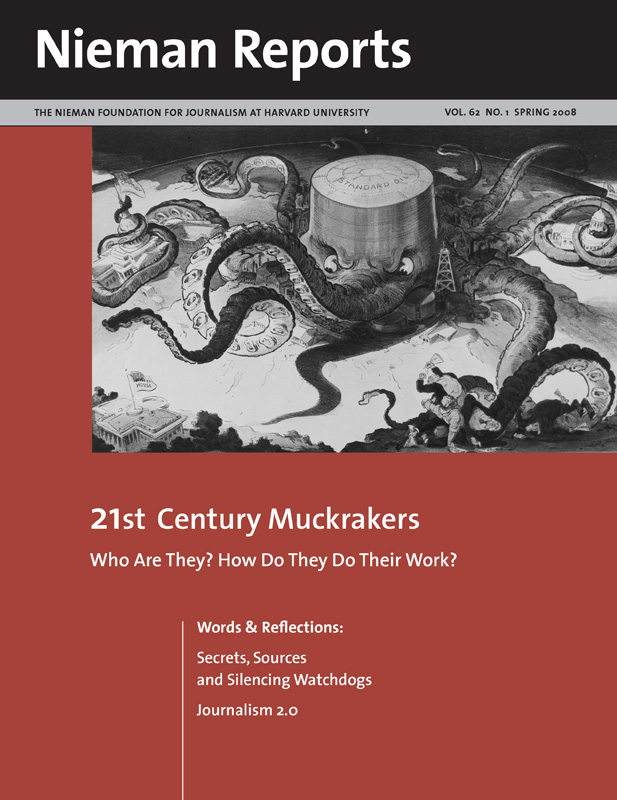It was 2005, and San Diego, once a model of good fiscal management, was flirting with bankruptcy, and “America’s Finest City” had been saddled with a new moniker, “Enron-by-the-Sea.” At The San Diego Union-Tribune, the region’s major metro, we’d been writing day-to-day about the fissures in the financial foundation and attempting to trace the origins, largely due to enormous pension obligations. At the same time reporters in our newsroom were mobilizing to dig deep into the city’s financial mess, our Washington bureau was exposing a personal real estate deal that Republican Congressman Randy “Duke” Cunningham made with a government defense contractor.
The region and the newspaper would never be the same.
During the next year, we made our watchdog reporting of city hall the priority in our newsroom. Computer-assisted reporting (CAR) provided a bedrock, as we produced nearly two dozen takeouts worthy of the “Watchdog Report” label we put on them. They were true enterprise, high-impact reports deserving of top play on the front page. And they created a buzz in the region that elected officials could not ignore.
REFERRED ARTICLE
“Digital Records Reveal Corruption on Capitol Hill”
– Marcus Stern and Jerry KammerSimultaneously, our reporting—combined with the investigative work of Marcus Stern and Jerry Kammer at the Copley News Service bureau in Washington—on Cunningham gave federal prosecutors the grist for a case that drove him out of office and eventually to prison, where he is serving an eight-year, four-month sentence. Experts called it one of the worst cases of corruption involving a member of Congress. And the Union-Tribune (along with the Copley News Service correspondents) earned its first-ever Pulitzer Prize for it.
Most importantly, both of these watchdog efforts—involving questionable actions and decisions by public officials from San Diego—drew inspiring praise from our readers.
While it’s tough to prove that good journalism translates into increased circulation, we know it retains civic-minded readers who don’t want to be told what to think but don’t mind being told what to think about. Doing this cements our bond with what is called in the industry our “core audience,” which many of us believe is the key to the survival of high-quality journalism. Notice that I didn’t say newspapers’ survival. As much of a newspaper junkie as I am—I grew up in a two or three-newspaper-a-day household—I’ve given up on being choosy about the delivery system. Delivering quality journalism is the point.
The Newsroom Shrinks
Fast-forward to 2007. The Union-Tribune newsroom underwent a painful round of buyouts. The Copley Press Inc. sold the smaller newspapers in the chain, leaving the Union-Tribune—long its flagship—as its main holding. By late fall 2007, the owners had offered more buyouts, including some taken by our Washington staff, and closed the Los Angeles and Mexico City bureaus. At year’s end, we had suffered a substantial number of layoffs, something this family-owned company has only done a handful of times in its 100-plus-year history. Our newsroom is now 25 percent smaller than it was in those heady days of 2005; the newsroom staff now numbers just shy of 300.
Putting out a daily newspaper, meeting the increasing demands of the Web, and plugging the holes left by departing staffers pushed much of our watchdog work to the sidelines. The commitment continued, though, particularly in our five local bureaus, including our office in Tijuana. There, we led national coverage of battling drug cartels and their cross-border tunnels, as well as the escalating violence in that region, which is popular with international tourists.
In spite of the cutbacks in the newsroom, Editor Karin Winner is determined not to allow the quality of the paper to diminish. She established a blueprint for the future with six initiatives that will set the agenda going forward: Watchdog reporting is at the top of her list. With an overwhelming amount of information now available wherever and whenever someone wants it, Winner argues that our newspaper has to concentrate on providing unique content and capitalize on our expertise and credibility. This means reinforcing our watchdog role and insisting it permeate everything we do, even if, as she acknowledges, there are obvious risks in holding powerful people accountable, especially if they turn out to be important advertisers. But she says our readers expect nothing less from us, and we intend to see to it that we meet their needs.
A Watchdog Committee was formed, which I chaired along with our news editor. We embraced Winner’s direction and set out to create a plan that would make watchdog journalism a cornerstone of Union-Tribune coverage. Much of what we recommended—and intend to carry out—is not new, but it represents for us, in these changing times, a reinvigorated zeal to continue the high caliber of investigative work we provided our readers in 2005. What follows are some of our committee’s key recommendations:
Establish watchdog reporting as a newsroomwide goal. Make this a goal for everyone from editors to reporters, copyeditors to graphic artists and photographers. Include this among expectations in performance evaluations. Watchdog work is not just about projects; it’s about an approach to beat coverage that should be reflected in daily and longer-form work.
Create a new oversight position in the newsroom. It’s not fair to make such a demand without providing avenues to succeed. To help meet the goals, a new position, Watchdog Editor, has been established. That editor has Winner’s imprimatur to negotiate staff resources throughout the newsroom to see that watchdog work is not just a good intention but also a lived reality.
Designate a core watchdog team. Such a team has been established. It’s small but versatile and influential. It includes two full-time reporters with CAR skills, two database experts, and a Web developer. It is working on refining a newsroom Intranet so databases we have collected, such as check rosters and contracts from local cities, voter registrations and campaign donations, are easy to search, even for fast-moving daily reporting. The team also is working on providing more of our data on the Internet for the public to scrutinize and use. For example, the team worked with multimedia-savvy graphic artists during the wildfires of October 2007 to create interactive maps that tracked the progress of the flames and the homes destroyed.
Encourage beat reporters to suggest investigative stories. Beat reporters from across the room, including metro, business, sports and special sections, pitch short-term and project-level ideas to the watchdog and other editors. We are planning investigations on subjects ranging from the military and the environment to sports and food. As their topics are chosen for investigation, they are rotated on to the team and joined by one or more CAR specialists for the duration of their project.
Examine how beats receive continuous coverage. One general assignment reporter from metro has been designated to beat-hop, filling in for reporters who rotate onto the watchdog team. Other reporting gaps will be filled in the traditional way—doubling up reporters on beats.
Training watchdogs. Training is an essential component of this effort. Because money is scarce and research staff has been cut, reporters with special CAR or other investigative skills will be the trainers. We plan a variety of sessions, including brown bag lunches about the nuts and bolts of election coverage and public access issues, as well as hands-on training to explain how to work with databases and conduct advanced Internet searches. We encourage attendance at important conferences and cover some expenses (including paid time off) for educational experiences such as the National Institute for Computer Assisted Reporting and the annual conference of Investigative Reporters and Editors.
Engage with readers. We have plans for community outreach and promotion about our renewed watchdog efforts. Reporters and editors get out in the community and speak with business and community groups about watchdog journalism, explaining why our newspaper does it and how. We also do in-paper and online promotions of the work.
RELATED WEB LINK
The San Diego Union-Tribune
signonsandiego.comLet readers know when watchdog reporting appears. Finally, although it may seem obvious, we label our watchdog work for readers, who have told us they appreciate having those stories highlighted in print and on the Web. We are working on a destination page on our Web site, so we can provide easy access to our current and archived watchdog journalism.
In 2008, San Diego’s financial woes are far from over. Ballooning pension obligations continue, and with financial reports still outstanding the city can’t go to the bond market. The Union-Tribune will reexamine the city’s money mess, particularly in this year when the mayor is facing reelection and four council members must be replaced because they have served their full terms. Our real measure of success, however, will be how well we instill the watchdog culture across the newsroom and how that translates into results.
Lorie Hearn, a 1995 Nieman Fellow, was metro editor of The San Diego Union-Tribune for nine years until February, when she was named senior editor for watchdog journalism.



